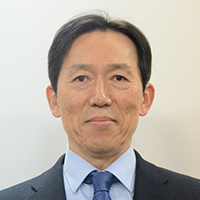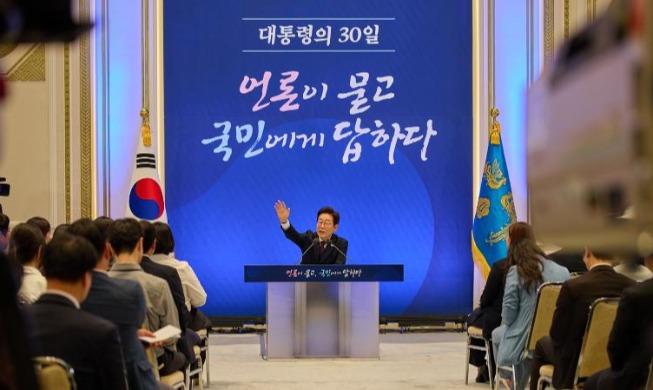
By Jun Bong-Geun
Professor, Korean National Diplomatic Academy
North Korean leader Kim Jong Un on April 12 expressed his willingness to hold a third bilateral summit with the U.S. in a speech to the Supreme People's Assembly. He had undergone a long period of contemplation since Pyeongyang's last summit with Washington in Hanoi, Vietnam, on Feb. 28 had failed to make progress in the North's denuclearization.
In his speech, Kim said he was open to holding a third summit by saying the North "will be patient and wait until the end of this year." He added, "If the U.S. proposes holding a third round of summit talks after finding a methodology that can be shared with us with a proper attitude, we are willing to try one more time."
Responding to Kim's speech, U.S. President Donald Trump through Twitter agreed on the possibility of another high-level meeting, saying "a third summit would be good in that we fully understand."
Experts, however, are not optimistic that another summit between both sides will produce results. This is because of the wide gap between the denuclearization requirements of the U.S. and the demand for reciprocal measures from the North. It also seems unclear that both leaders will hold face-to-face talks again with no guarantee of political and diplomatic progress. So what can be done to achieve a breakthrough in this situation?
One recommendation is to go back to the basics when the situation grows complex and complicated. Based on why countries decide to go nuclear, many scholars cite four main factors: guarantee of national security, domestic politics, international image and decisions made by political leaders. Among these factors, the security guarantee is particularly important. Since taking effect in 1970, the Treaty on the Non-Proliferation of Nuclear Weapons has banned the spread of nuclear armaments. Countries pursuing nuclear development have been branded "rogue states" and faced global isolation, paying the high price of strong international sanctions.
Still, a tiny number of countries that face security threats take on the risk of nuclear development. One such country is North Korea, whose security environment grew weaker in the post-Cold War era. It suffered a security and economic crisis due to the collapse of the communist bloc. South Korea, toward which the North has shown hostility, has an economy 50 times bigger than that its neighbor. And the U.S. is the world's strongest military power.
These points provide the background on why past nuclear agreements with the North have been unsuccessful; they failed to resolve Pyeongyang's fear for its survival. After visiting the North Korean capital in March 2018, South Korea's National Security Director Chung Eui-yong delivered a message from Kim saying, "There is no reason to possess nuclear weapons if the regime's safety is guaranteed and military threats to the North are removed." This means Kim fully knows the reasons for going nuclear and denuclearization.
Thus to achieve progress in denuclearization during the next North Korea-U.S. summit, the resolution of the North's security issues, the core reason for Pyeongyang's nuclear development, is required. To this end, I propose the following measures.
First, the "three no's" of the South Korean government and the "four no's" of the U.S. administration need reaffirmation. The three no's refer to no desire for the North's collapse and no pursuit of reunification through absorption or artificial means. The four no's are no pursuit of regime change and/or collapse, no attempt to speed up reunification and no intent by American forces to enter the North.
Second, both Koreas need to sign a basic bilateral pact to ensure mutual non-aggression and non-intervention. This agreement will stabilize inter-Korean relations like the 1972 Basic Treaty did between East and West Germany, an accord that had both sides recognize each other as sovereign states.
Third, the North and the U.S. should swiftly begin negotiations on setting up formal diplomatic ties to forge a "new North Korea-U.S. relationship" per the joint statement in their first summit in Singapore last year. This will help Washington reconfirm its intent to give up a policy of hostility and non-aggression toward Pyeongyang according to the latter's request.
Such measures will bolster relations between both Koreas as well as those between Washington and Pyeongyang, while reducing hostility. The denuclearization of North Korea should also follow in tandem. Doing so raises the potential for success in a third summit between the North and the U.S., which will serve as a positive step toward the goal of a permanent peace regime on a nuclear-free Korean Peninsula.
Dr. Jun Bong-Geun is a professor at the Department of Security and Unification Studies of the Institute of Foreign Affairs and National Security (IFANS), a think tank under the Korean National Diplomatic Academy in Seoul.
Translated by Korea.net staff writer Yoon Sojung
Most popular
- Grammy-winning producer calls Suga of BTS 'amazing artist'
- Animated 'KPop Demon Hunters' tops Netflix charts in 41 markets
- 'Squid Game' events to pump up K-Content Seoul Travel Week
- Reunited BLACKPINK releases video preview of world tour
- 'Universal love, family' themes fuel success of 'King of Kings': director
